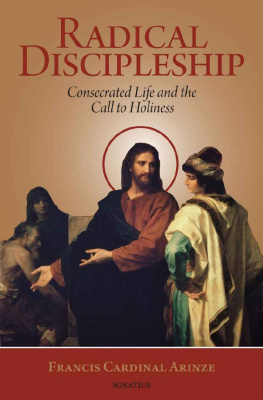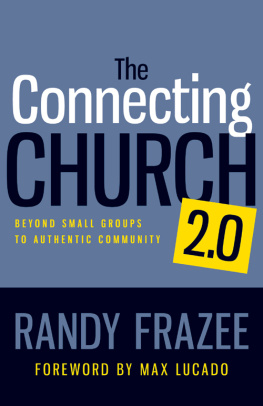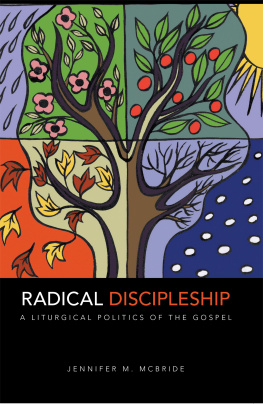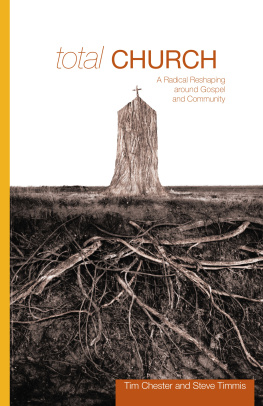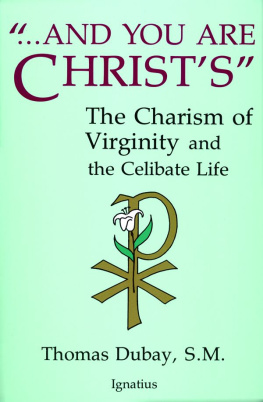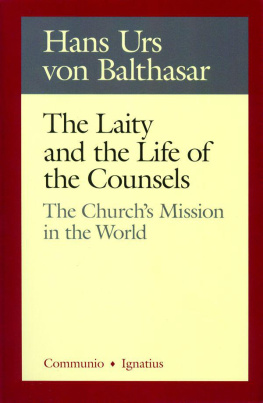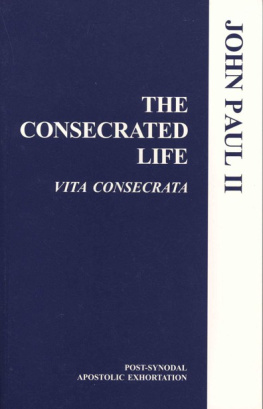Radical Discipleship
Radical Discipleship
Consecrated Life and
the Call to Holiness

Francis Cardinal Arinze
IGNATIUS PRESS SAN FRANCISCO
Cover art:
Christ and the Rich Young Ruler (detail)
by Heinrich Hofmann (18241911)
Riverside Church, New York City
Courtesy of Wikimedia Commons
Cover design by Davin Carlson
2015 by Ignatius Press, San Francisco
All rights reserved
ISBN 978-1-62164-010-3 (PB)
ISBN 978-1-68149-396-1 (E)
Library of Congress Control Number 2014949950
Printed in the United States of America
CONTENTS
Introduction
Our Lord and Savior Jesus Christ has by his life, example, and teaching attracted millions of people to follow him through the centuries. Indeed, his invitation to his first disciples was Follow me. The four Evangelists all record this (cf. Mt 4:19; 8:22; 9:9; Mk 1:17; 2:14; Lk 5:27; 9:59; 18:22; Jn 1:43; 21:19, 22). Christianity was in the earliest days called the Way. The Acts of the Apostles uses this term without further qualification six times (cf. Acts 9:2; 19:9, 23; 22:4; 24:14, 22). Three times there is further specification: the way of salvation in Acts 16:17; the way of the Lord in Acts 18:25; and the way of God in Acts 18:26. The religion established by Jesus Christ is understood as a following of Christ. The Second Vatican Council regards the Church as the people of God, a messianic people ( Lumen Gentium , 9) that walks through history, following Christ. It was later in Antioch that the disciples of Christ were for the first time called Christians (Acts 11:26).
One of the most radical ways of following Jesus is what has in the history of the Church developed and been technically called the consecrated state. Pope Francis has declared 2015 the Year of Consecrated Life. This little book is an effort to contribute to reflection on the consecrated life in the Church. It is not a dissertation based on deep research on the theology of the consecrated life and the canon law pertaining to it. There are already many publications on that. What is offered here is a reflection, with the hope and prayer that this life may be better understood, loved, lived, and promoted.
We shall first ask ourselves what are the origins of the consecrated life, starting from the Gospel itself. The essentials and various forms of this life will next be examined. An idea will be given of the number of consecrated men and women in the Church of our days. The Church has shown in many ways her appreciation of life in the consecrated state, and it is as well that a little of this be recalled. A central consideration has to be the three evangelical counsels that all consecrated people take as vows. Community life is part and parcel of most forms of the consecrated life and needs our attention. The prophetic dimension of the consecrated life is striking to all observers, and we need to thank God for it. Thereafter, the vocation of religious brothers will be reflected upon because some people have quite a problem in understanding and respecting it. The consecrated state brings many blessings to Church and society, and some of these need to be recalled. As in all states of life, there are some consecrated people who do not persevere in that state to the end. An examination of some of the problems and challenges involved in consecrated life can help to encourage many more to persevere in this vocation. This book will close with a consideration of some of the responsibilities of the whole Church toward the consecrated state.
I
Origins of the Consecrated Life
Our Master Jesus Christ lived a life that was poor, chaste, and obedient. His followers strive to follow him, each person according to his vocation and mission. The call to the Christian life is in itself a call to holiness, which is the perfection of charity. Jesus himself invited all his followers to be perfect, as their heavenly Father is perfect (cf. Mt 5:48). He did not institute the consecrated state in the same way in which he gave us the sacred priesthood. Nevertheless, his life and his teaching lead to the living of discipleship according to the evangelical counsels. Two Gospel accounts help us to understand this. In Matthew 8:1822, Jesus teaches us that to follow him in the kingdom that he is inaugurating calls for a commitment that is total and demanding. A scribe comes to him and says that he will follow Jesus wherever he goes. The reply of Jesus is that he does not promise his followers economic security but asks of them total commitment. They are to follow him in the daily uncertainties of service of the kingdom and to rely on Divine Providence: Foxes have holes, and birds of the air have nests; but the Son of man has nowhere to lay his head. Another person (vv. 2122) tells Jesus that he will follow him after discharging his family obligation to bury his parents. Jesus replies: Follow me, and leave the dead to bury their own dead. This at first appears shocking, but it is really no more than what was required of a person who had the nazirite vow in the Old Testament (cf. Num 6:67) or of a chief priest under the Mosaic law (cf. Lev 21:11). What Jesus is saying is that the urgency of the kingdom takes precedence over family obligations (cf. Mt 10:3539; 12:4650; 19:29). That is the sense in which Jesus later says: Whoever does the will of my Father in heaven is my brother, and sister, and mother (Mt 12:50). And every one who has left houses or brothers or sisters or father or mother or children or lands, for my names sake, will receive a hundredfold, and inherit eternal life (Mt 19:29).
In a second Gospel account, a rich young man comes to Jesus and asks what good deed he must do to have eternal life. Jesus replies that to enter life, he should keep the commandments. He says to Jesus: Which? Our Lord replies: You shall not kill, You shall not commit adultery, You shall not steal, You shall not bear false witness, Honor your father and mother, and, You shall love your neighbor as yourself. When the young man replies: All these I have observed; what do I still lack? Jesus says to him: If you would be perfect, go, sell what you possess and give to the poor, and you will have treasure in heaven; and come, follow me. We are told that when the young man hears this he goes away sorrowful; for he has great possessions (cf. Mt 19:1622). We see from this Gospel narrative that Jesus is inviting the young man to prove his love of God and neighbor by selling all he has and distributing it to the poor. Both this life and eternal life are gifts of God, who alone is good. People do not earn salvation by their own performance. It is Gods gift. The rich young man does not accept the invitation.
We can see in these two Gospel accounts a distant call to that life which would later in the history of the Church blossom into the consecrated state in which a person lives chastity, poverty, and obedience as a vowed state. We can also see such an invitation to perfect love of him when Jesus later says to his followers: He who loves father or mother more than me is not worthy of me; and he who loves son or daughter more than me is not worthy of me; and he who does not take his cross and follow me is not worthy of me. He who finds his life will lose it, and he who loses his life for my sake will find it (Mt 10:3739). And let us note that our Savior said this to all his followers. People in the consecrated state are striving to follow Christ with radical fidelity.
The earliest Christian community began already to anticipate what we now associate with the consecrated state. The early Christians had one heart and one soul, and they had a common possession of goods. Those who possessed lands or houses sold them and brought the proceeds, laying them at the feet of the Apostles, and distribution was made to each person according to need. Barnabas was expressly mentioned as one of those who did this, while Ananias and his wife Sapphira indeed sold their piece of property but retained some of the money and made a false declaration before the Apostles. Both of them were struck dead (cf. Acts 4:325:111). This early practice of detachment from earthly goods and willingness to share in a common life show that some of the elements that were later regarded as expressly characteristic of the consecrated life were already beginning to be lived by the early Christians.
Next page
